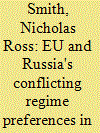|
|
|
Sort Order |
|
|
|
Items / Page
|
|
|
|
|
|
|
| Srl | Item |
| 1 |
ID:
141446


|
|
|
|
|
| Summary/Abstract |
There is a profound disconnect between the practice and scholarly study of security in Europe. The 2010 Internal Security Strategy added disasters such as forest fires, earthquakes, and floods to the list of European Union (EU) internal security concerns, expanding on the more traditional anxieties over militaries, border protection, and the effects of poverty. This article explores how evolving practices of disaster response, a policy area once separate from EU security discourse, have become part of the EU's wider security provision and with what implications. Based on interviews conducted at the Directorate-General (DG) for Humanitarian Aid and Civil Protection (ECHO), it provides a detailed study of three EU disaster response practices – monitoring, training, and information co-ordinating – and their circulation to the wider field of EU internal security provision. It uses this case to outline that new understandings of what it means to “voluntarily co-operate” in European security projects have been radically under-theorized.
|
|
|
|
|
|
|
|
|
|
|
|
|
|
|
|
| 2 |
ID:
141442


|
|
|
|
|
| Summary/Abstract |
This article will work towards a multi-level collective action approach for understanding the deployment of Common Security and Defence Policy (CSDP) military operations. It is multi-level because it uses three levels of analysis: firstly, the international level, where events that create threats to certain values catalyze the process leading to the deployment of an operation; secondly, the national level, where EU governments formulate their national preferences towards prospective deployments based on utility expectations; and thirdly, the EU level, where EU member states negotiate and seek compromises to accommodate their different national preferences. The strength of the model will be demonstrated through empirical case studies on the deployment processes of EUFOR Althea in Bosnia and Herzegovina and EU NAVFOR Atalanta off the coast of Somalia. The article will also provide an overview of the existing theoretical literature on the deployment of CSDP military operations.
|
|
|
|
|
|
|
|
|
|
|
|
|
|
|
|
| 3 |
ID:
141447


|
|
|
|
|
| Summary/Abstract |
The Organization for Security and Cooperation in Europe (OSCE) is perhaps the world's least-known major security organization. However, the same characteristic which puts the OSCE seemingly continually on the verge of irrelevance with respect to the other actors in European and global security is in fact what has allowed it to endure and is in fact its greatest asset. That is, the OSCE's distinct combination of modern and postmodern characteristics in both its composition and its activities allows it to create what can be called “embedded security”. Tracing the evolution of one particular set of decision-making rules embedded within a normative framework which questioned the fundamental meanings of “security”, and exploring present-day activities, this article reinterprets the OSCE in the light of this new model. In so doing, it re-contextualizes both the OSCE's origins and its contemporary relevance. Instead of a modernist, functional, rule-driven interpretation which situates the OSCE on the periphery in a crowded field, this explanation puts the OSCE at the centre of the postmodern and normative European security architecture.
|
|
|
|
|
|
|
|
|
|
|
|
|
|
|
|
| 4 |
ID:
141444


|
|
|
|
|
| Summary/Abstract |
This paper evaluates the competitiveness of the European Union (EU) and Russia's regime preferences in their foreign policies towards Ukraine in the scope of the on-going Ukraine crisis. It is argued that the underpinning geopolitical environment Ukraine currently resides in, wedged between two much larger powers (the EU and Russia), renders it a vulnerable target state for regime promotion from both sides. Indeed, since the 2004 Orange revolution in Ukraine, both the EU and Russia have had discernible regime promotion strategies in their foreign policies. The EU's regime promotion has focussed on facilitating democracy in Ukraine, along with more material interests (trade and strategic aims) while Russia has reacted with increasingly zero-sum policies which pursue its preference for having a loyal and Russian-facing regime in Ukraine. Ultimately, the increasing competitiveness of the EU and Russia has been a key factor in the onset of the Ukraine crisis, which offers important insight into the relationship between large powers and the smaller third states which lie in their overlapping spheres of influence.
|
|
|
|
|
|
|
|
|
|
|
|
|
|
|
|
| 5 |
ID:
141445


|
|
|
|
|
| Summary/Abstract |
The so-called Schengen compensatory measures such as the Schengen Information System (SIS) or the European Dactylographic System (Eurodac) have been the centre of much attention. However, the research on these security measures has focused almost solely on their effect on liberty, human rights, and the like. Not much attention has been given to the actual effectiveness of the security remedies taken in the European Union (EU) to compensate for the abolition of border controls, despite effectiveness being an obvious source of legitimacy in the realm of security. This article takes a first step in the direction of correcting this neglect and develops the foundations for an analytical framework focusing on effectiveness and legitimacy. The framework is illustrated through a minor analysis of the legal and institutional set-up of SIS and Eurodac as examples pointing to sources of ineffectiveness in the very set-up of the databases.
|
|
|
|
|
|
|
|
|
|
|
|
|
|
|
|
| 6 |
ID:
141443


|
|
|
|
|
| Summary/Abstract |
The mediation efforts of the European Union (EU) Delegation in Yemen started with the uprising in 2011 which led to the conclusion of the National Dialogue Conference in 2014. This article examines the EU's understanding of mediation vis-à-vis its practice. The case of Yemen lends itself to trace EU mediation capabilities from the implementation of the “Concept on Strengthening Mediation and Dialogue Capacities” to a more systematic approach because the Mediation Support Team (MST) of the European External Action Service took office in 2011. Building on an analytical framework of mediation as a tool of EU foreign policy, this article demonstrates how EU mediation presents itself along a political and a technical dimension. The collaboration of the MST and the EU Delegation personnel in Yemen fostered an increase in mediation awareness. However, it could not develop its full potential as the UN Special Advisor sidelined the EU and other members of the Group of Ten Ambassadors through his proactive approach. Despite those difficulties of standing up to established actors in the field, this study argues that EU mediation is about balancing its political and technical dimension. For now, the political seems to outweigh the craft of mediation in the case of Yemen.
|
|
|
|
|
|
|
|
|
|
|
|
|
|
|
|
| 7 |
ID:
141448


|
|
|
|
|
| Summary/Abstract |
A quarter of a century after the fall of the Berlin Wall, the role of the Bundesrepublik in Europe is once again the focus of international scrutiny and academic debate. Having long been seen as a “reflexive multilateralist” and “tamed power”, with a “leadership avoidance reflex” and a “civilian power” strategic culture, the Eurozone crisis has pushed the Berlin Republic into the role of “reluctant hegemon”. At the same time, however, Germany has been widely criticized by its EU and NATO partners for its half-hearted commitment to the Afghan war and its failure to support its allies in the Libyan intervention. Prompted by a call by Federal President Joachim Gauck in 2013 for Germany to live up to its international responsibilities, new themes in foreign and security policy have recently emerged. At the Munich Security Conference in February 2014, a more active and engaged approach was outlined by both the Foreign and Defence Ministers. This paper will examine recent shifts in the discourse of German foreign and security policy, and considers the extent to which these have been accompanied by significant shifts in policy outcome and implementation – particularly in the light of the Ukrainian crisis.
|
|
|
|
|
|
|
|
|
|
|
|
|
|
|
|
|
|
|
|
|